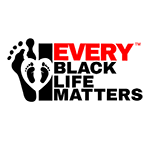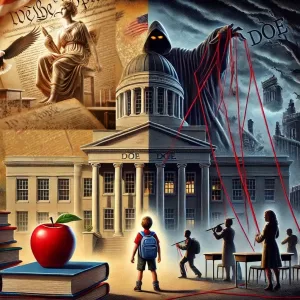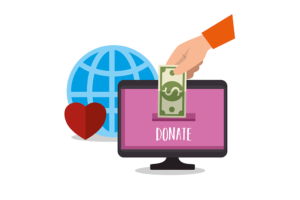What is a Universal Basic Income?
Well, in short, a UBI is a system where the government supposedly hands out a fixed amount of money to every citizen on a regular basis… whether they work or not. Sounds simple, right? Everyone gets free money. No strings attached. No work required.
What could possibly go wrong?
Advocates tell us it’s the answer to poverty. They claim it’ll replace the broken welfare system. They say it’s a safety net for when Artificial Intelligence (AI) takes over all the jobs.
They promise it’ll give people dignity, security, and freedom.
The idea isn’t new, but it’s gained steam in recent years, pushed by billionaires like Bill Gates, and globalist organizations like the World Economic Forum (WEF). These are the same people and groups that think they can socially engineer society from the top down. They claim that AI and automation will replace human labor to such an extent that millions will be permanently unemployed, and the only solution is for governments to hand out free money to keep people afloat.
The WEF—famous for ideas like “You will own nothing and be happy”—promotes UBI as part of its so-called “Great Reset.” They believe a global system of managed resources and controlled income will keep people pacified while elites run the world. Bill Gates pushes UBI as an inevitable outcome of tech replacing labor, ignoring the fact that his own success came from a system that encouraged work, innovation, and creativity—not guaranteed handouts.
The irony? These are some of the richest people in the world, who made their fortunes by leveraging human creativity, competition, and free enterprise. Now they’re advocating for a system that assumes people are no longer necessary.
The whole concept of UBI is built on fundamentally flawed assumptions because first AI is not the devil and second AI is not the end.
How does AI really work?
First let me assure you that I speak from a modicum of experience, I have advanced degrees in Engineering and Physics, I’ve worked over 40 years in the industry, I’ve started 5 startup companies, I have a few patents. I’ve heard all this before. I studied some AI in the late 1990’s with a startup company that I was working with.
Let me break down how AI actually works.
It’s not magic. It’s not some thinking, dreaming brain. It’s a machine running on a process we designed. Here’s a simplified explanation.
We start by building a computing engine with a bunch of interconnected nodes—think of them like brain cells. Each layer of nodes feeds into another layer, and the more nodes you have, the more refined the system can be. Each of these nodes has a value, a weighting factor that determines how much influence it has on the final output.
Now, how do we give it information? We feed it data. If we want it to recognize a dog, we don’t hand it a picture and say, “Look, it’s a dog.” We feed it numbers. Specifically, we break down the image—let’s say a BMP file—into raw pixel data. Each pixel has color values, usually in red, green, and blue (RGB) components. Those numerical values are what we feed into the AI as input. It doesn’t see a dog. It doesn’t even see a picture. It sees a long list of numbers that describe the color and brightness of tiny squares on a screen.
Once we’ve fed it those numbers, we ask a simple question: Is this a dog? The system takes a guess. In the simplest version, it spits out a 1 (yes) or a 0 (no).
Now here’s the key: we humans, not the machine, tell it if the answer was correct. And if it’s wrong, all those nodes get virtually “slapped” with some negative reinforcement—a kind of punishment. If one node had a weighting of 0.5, that value might get reduced to 0.4. That way, next time, the system is less likely to output a 1 for that input. If it’s right, those nodes get rewarded—the 0.5 becomes a 0.6—making it more likely to output a 1 the next time.
Over time—after doing this over and over again—it gets better at guessing which combinations of pixel values and patterns typically represent a dog. But it only improves because the values are being constantly tweaked and weighted by trial and error. There’s no magic moment where it suddenly understands anything. It’s not thinking. It’s not learning the way people do. All it’s doing is remembering which answers got a thumbs up and which ones got a thumbs down. And when it outputs its answer, it’s still just spitting out 1’s and 0’s. That’s it.
AI can’t create anything new. It can’t imagine anything that hasn’t already been fed into it. At best, it can mash together old ideas and notice patterns we might have missed. But even then, it needs a human to tell it whether that pattern makes sense or not. Whether it’s good or bad. Whether it works or fails. AI doesn’t have a soul, it doesn’t have a mind, and it certainly doesn’t have purpose. That’s what we humans bring to the table. Souls are multidimensional, bodies and computers are mere 3 dimensional plus time.
Now sure, you can program AI to go out into the world, test those patterns, and self-adjust. Some sort of survival of the fittest. But who decides if those tests are really a success? Not the machine. We do. People are the judge. People define the goal. People tell it what matters. If survival of the fittest was always the answer, charity towards those who could never pay you back would be considered evil.
The only way AI would want to “take over the world” is if there was someone “rewarding” it to do so. Otherwise AI just doesn’t care. In other words, AI is as dangerous as the crossbow, the machine gun or the atomic bomb All which were already supposed to have ended civilization as we know it. The problem has never been the tool. It’s always been what people choose to do with it.
UBI Assumes Technological Innovation Will Eliminate Work
UBI’s biggest selling point is the fear that AI and automation will destroy jobs permanently. Let me ask you something. Has there ever been a time in human history when innovation destroyed work? When we invented the plow, farmers didn’t vanish. When factories rose, humanity didn’t go idle. But UBI elitists assume that technology has a finite trajectory—solving all problems without creating new ones.
Every major technological shift in history has indeed eliminated old jobs but they always then created entirely new industries, needs, and opportunities. The Industrial Revolution didn’t end work; it shifted human effort toward manufacturing and services. Computers didn’t put people out of work; they gave rise to the entire tech industry. UBI ignores this pattern and assumes humanity will run out of things to do. History—and human nature—say otherwise.
And yet, UBI elitist advocates insist this time is different. Why?
Is it because AI is faster? Is it because automation is smarter? No, it’s actually just because a handful of billionaires told us so? That’s the first lie. And it’s why UBI makes no sense.
AI Can Replace Tasks, Not Creators
AI can automate repetitive tasks and replicate existing work, but it can’t originate or imagine something entirely new.
- It can replace painters, but not artists.
AI can generate images, but it can’t create art that expresses the human soul.
- It can replace repairers, but not mechanical engineers.
AI can follow procedures to fix what’s broken, but it can’t invent entirely new machines or systems that solve problems no one’s thought of yet.
- It can replace tailors, but not fashion designers.
AI can mass-produce custom-fit clothes, but it can’t set cultural trends or push creative boundaries the way a designer does.
- It can replace movie makers, but not art makers.
AI can crank out formulaic scripts, but it can’t craft original stories that challenge, inspire, and move the human heart in new ways.
- It can replace cooks, but not chefs.
AI can follow recipes with perfect precision, but it can’t invent bold new dishes that blend culture, tradition, and innovation. A chef doesn’t just assemble ingredients; they tell a story on the plate, creating experiences that evoke emotion, stir memory, and spark something entirely new. AI can’t taste. It can’t imagine flavor combinations that have never existed. It can mix a few things together but at some point a human has to taste it. And it certainly can’t lead the next culinary revolution.
AI doesn’t lead; it follows. It doesn’t imagine; it processes. It doesn’t create, it copies.
It’s dependent on the human mind for its inputs and has no concept of truth, beauty, or meaning.
AI will actually allow more creation than before
When I and a Greg Maturi created the World’s first MP2/3 player chip in 1992, it didn’t destroy the music industry, it grew it. Suddenly you could make and mix music at home and stream it and see if it catches on. Now an artist doesn’t need the approval of some elites in “music city” to pick the winners and losers of the music industry.
AI will create more artists, more chefs, more art makers and more mechanical engineers, because it will make all those skills easier to access so the creative part of each human’s soul can be expressed with ease.
AI Lacks Imagination—Humans Drive New Ideas
AI can analyze data and make predictions based on what already exists. But it can’t dream up entirely new industries, products, or experiences that have never been seen. Only humans have the imagination to create something from nothing. UBI assumes we are on the verge of a static world where no new needs or desires emerge. That’s not reality. Humans are driven to innovate because we are made to create. There will always be new problems to solve, new frontiers to explore, and new ideas to bring to life.
Now let’s go back to UBI
UBI Misunderstands the Human Role in the Economy
Work is not just about making a living—it’s about applying creativity, solving problems, and creating value. People need purpose and meaning, not just paychecks. UBI assumes that if machines take over old jobs, humans will have no role left to play. But humans decide what matters next. We move the goalposts. We are not obsolete; we are the ones imagining the future and solving new problems. If that weren’t the case, we would have never left the farming era. After all, 90% of people were farmers in the early days of civilization. Today, it’s less than 2%, and yet we have more people, more food, more work, more careers, and more opportunities than ever before. (Just remember, that doesn’t mean you should not have a backyard farm, you should).
Technological Growth Expands Opportunity, Not Limits It
As technology advances, it expands human potential. It frees people from repetitive labor and opens doors to entirely new areas—healthcare, space, energy, education, and more. UBI assumes technological progress is a zero-sum game. But human imagination makes it infinite-sum.
The Core Problem With UBI
The UBI Promoters say it would eliminate poverty, simplify welfare systems, and provide a safety net as technology replaces jobs.
Yes, just like when welfare did all that. Or wait may it was the New Deal, or the Great Society? Oh, you mean communism? Yes that’s worked well hasn’t it.
UBI is a foolish, wicked, unnecessary creation by the elites to try and control the masses. It’s going back to the days when the Duke didn’t want his peasants becoming self-sufficient. It’s the communist leaders who kept their people dependent on the state for food, housing, and purpose while they killed the innovators and the small farmer and businessman (until China figured out you could run a military dictatorship with just enough capitalism to keep the peasants busy. Yet, one day they will realize that stifling freedom stifles innovation). In truth, UBI is just an expansion of the socialist state, and it won’t work. Your need is their power. If you are dependent on them for your daily bread, you are already in chains.
But here’s the truth. This is not the end. Work is not a curse
UBI bets against human imagination. It assumes that humanity is nearing the end of its creative potential, and that the future is about managing scarcity instead of creating abundance. But history consistently proves otherwise. Human creativity is the engine of progress. AI can help accelerate that progress, but it will never replace it. As long as humans exist, meaningful work will exist, because we will seek it with fervor.
Work was given as a blessing before the curse. When God created Adam, He placed him in the garden to work it and keep it before sin ever entered the world. Take away the incentive to work and you create fatherless homes, apathetic citizens, uninvolved communities. It breeds gang members, criminals, and addicts. A society without meaningful work is a society without fathers, leaders, and builders. And a society without Biblical moral values is a society that is dying—soon to be replaced by those who race to the vicious, depraved bottom until they destroy themselves. This is the history of the empires—from Babylon to Rome to the Soviets.
If they haven’t already thought it through and planned it, these elitists will eventually have to use these same machines to control the masses—AI police, AI armies, AI surveillance to manage the very people they made idle and restless. And that is something we must never let happen.
Let’s end with this:
Creativity is not 3 Dimensional
Human creativity is unique because it reflects the First Creator. Human imagination is unique because it draws from the Source of all imagination. Human aspiration is unique because we are the Imago Dei—the image of God.
As God is infinite, human creativity will continue as long as man exists—bringing new ideas, new technologies, new movies, new stories, new types of food, new music, new science, new discoveries. And more wondrous still, we will create for all eternity and we will never run out of ideas.
Over the ages there have been the smug ignorant who said things like: “Everything that can be invented has been invented.” That was Charles Duell, the Commissioner of the U.S. Patent Office in 1899. Others believed that Newton had explained all there was to know about the universe. Then along came Einstein, who shattered that false ceiling and opened the door to modern physics. Even Einstein himself admitted, “We still know less than 1% of 1% about anything.”
I would take that even further: we have discovered far less than one trillionth of less than one trillionth of anything that God has made. We are barely scratching the surface. And the pace of this innovation is only getting faster. Tomorrow there will be new discoveries that shock us beyond the ones we’ve already made and we still will not have scratched the surface.
And finally, remember again: AI cannot create; it can only copy and wait for us to validate. It cannot be the engine of discovery because it has no soul, no wonder, no divine spark. It is not the Imago Dei. AI is as useful as a washing machine or a tractor. Use it well, use it wisely, use it to achieve your creative goals.
In short, UBI makes no sense because it assumes the story is over. But as long as we reflect the Creator, the story is only just beginning.











